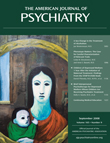I was in the middle of a hectic night on call in the ED. I had a long list of patients to see—all with suicidal ideation of one form or another.
I begin evaluating the next patient. Stifling a yawn, I smoothly transition from HPI to ROS. How’s your sleep, appetite, energy? I am on a roll. Past Psychiatric History and Family History pass by like signposts on a late-night road trip. Turning the corner onto Social History, I am moments away from being able to check the patient off my list and that much closer to a few stolen moments of sleep.
“Have you ever been abused?” With that question, the momentum is broken. The patient, an older African American female, gets a faraway look in her eyes.
“Back then,” she finally says, “They could not get black teachers for the school in my neighborhood. So I had a white fourth grade teacher.” The patient reflected on how honored she felt that he singled her out and gave her special jobs to do. “I had never been shown attention from a white man before.” But then one day he took her into the broom closet and molested her.
Mesmerized, I listened as the patient shared how more and more men from the neighborhood sexually abused her—shopkeepers, neighbors, cousins, brothers. When she challenged her brothers, they said, “That is just the way it is supposed to be.” The men would call to her from their houses as she walked down the street. “Hey, do you want a quarter?” The patient confided that she loved to swim and a day’s admission to the pool cost a quarter. “I swam every day.”
Quietly, the patient told me how much she hated it. How she would constantly change her walking route to avoid the calling men. But still they would find her. She had no one to go to for help. Her family was poor, and her mother was always working. Her father was an alcoholic.
But a neighbor lady seemed to know what was happening. One day, she gave the patient her daughter’s old green bike. Now the men would call, but the patient could pedal fast and get away. “Yes, I loved that green bike,” the patient smiled, “I took such good care of it.”
Deeply touched, I gazed upon this former medical record number on a checklist and said, “You are a strong woman.” She looked at me and said, “That is the way with African American women. We have to be strong no matter what. We are just supposed to take whatever life gives us. We are not supposed to ask for help.”
Silently, I thanked her for derailing my goal-directed history evaluation, and for taking me on a cross-cultural detour through the pain of poverty, racial tension, and sexual aggression. Her story of the power of a neighbor’s kindness in the midst of a neighborhood’s inhumanity touched my soul, and forever I will carry the image of that old green bike along with the determined little girl for whom it was a link to sanity.

